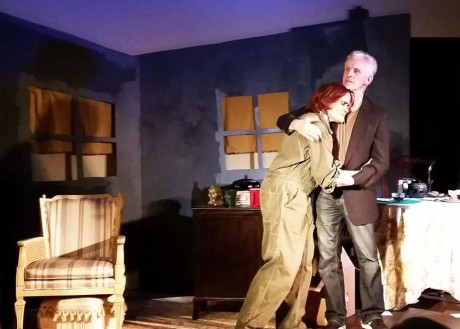Four-year-old Arcturus Theater Company—a group of DC theater enthusiasts committed to presenting plays that will “prompt discussion on topics that do not come up naturally in everyday conversation”—has chosen as its entry in the Women’s Voices Theater Festival The Point, by Marilyn Ansevin Austin. The Point is about a subject no one wants to contemplate much less talk about: the faltering of one’s mental faculties as one homes in on the end of one’s life. As such the play becomes a discomfiting occasion to think about the end of thinking.

This is a first work for the stage by Austin, a late-blooming playwright who has been in private practice as a psychotherapist; and in the script one can sense evocative familiarity with troubled and haunted psyches. The main character, Fran (played by Margeaux Martine)has been a successful physician. She has been the main support of her family (her grown ungrateful children—two daughters and two sons—and a ne’er-do-well husband) but now finds herself loosing track of more and more. As the play opens, in the well-appointed living room of her home on the ranch she owns, Fran is feebly trying to remember how to do her taxes as she forgets her appointment for an important licensing exam. In her character one can sense the incipient fear of aging—not only out of one’s profession but out of one’s mind.
Fran’s dearest friend is Annie (Melissa B. Robinson), who is older but sometimes calls Fran “Mother.” Theirs is a touching and mutually supportive sisterhood—Annie also helps out by feeding Fran’s horses—but Annie is aware that Fran is slipping. Early on in the play Fran, in order to silence an incessantly barking dog, takes out her pistol and shoots it. “I don’t know why I did that—shot my dog,” she tells Annie.
In yet another of the dubious decisions Fran has made without thinking clearly, she has offered free room and board to a hunky ranch hand named Greg (Mohamed Numan). Greg doesn’t actually do much work—he slacks off on all his chores—but instead plays on Fran’s sexual vulnerabilities. In the first hint of dark shadows in the play’s back story, Greg forcefully comes on to Fran and tells her, “I want to be in bed with you—just like your daddy was.” He also—in the run-up to the shocking scene that ends Act One—callously extorts her.
Another dear friend of Fran’s is Jerry (Kim Curtis), a former priest. We get a graphic clue as to why he’s defrocked when Julie (Cristen Stephansky), one of Fran’s daughters, arrives and we learn that years ago she accused “that groping old pedophile” of some really bad touch. In a confrontation between Julie and Jerry—the sharpest-edged scene in the play—we hear Jerry defend himself against those charges: he claims that what Annie felt was inappropriate was innocent and misconstrued. I was uncertain whether the playwright intended for us to believe Julie or Jerry (I myself was persuaded by Annie), but I definitely got a compelling picture of just how askew Fran’s judgment had become: She had never mentioned to Julie that she was friends with Jerry, and Julie arrives to find her molester in her mother’s embrace.
A lone man above reproach makes a walk-on appearance near the end, a Delivery Man (Will Hawkins, who also designed sound and lights).

The dark recesses of The Point’s back story contain the makings of a roiling and gripping drama. An aging MD who adored the father who may have molested her, a daughter betrayed not only by her priest but her own mother, a manipulative grifter who plays on an older woman’s insecurities… Unfortunately that’s not how The Point plays (though there is much grist here for substantive and topical discussion). As playwriting craft, its carpentry is shaky. Scenes don’t so much end as simply stop. The dialog has motivation holes and pacing problems. The script needs workshoping and woodsheding and a good dramaturg in the wings.
The acting was servicable but rarely more. Director Ross Heath has staged the work on the cramped stage of a church assembly room packed with so much furniture the actors can barely maneuver around it. There was an awkwardness throughout, unrelieved by the kind of emotional insight that Austin’s fascinating and provocative raw material warranted.
A true flash of brilliance, however, could be heard in Music Composer Evan J. Dice’s score. a portion of which can be heard here.
Running Time: One hour 20 minutes, including one intermission.
The Point plays through October 10, 2015, at Arcturus Theater Company performing at Capital Hill Presbyterian Church – 201 4th Street SE, in Washington, DC. Tickets may be purchased online.





